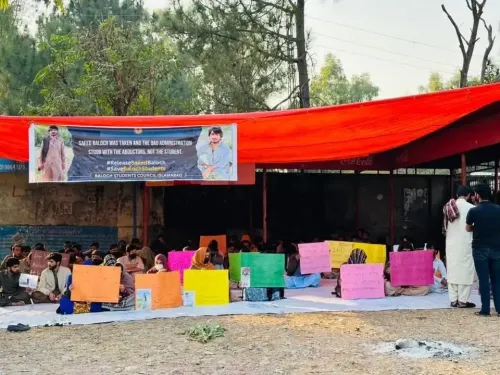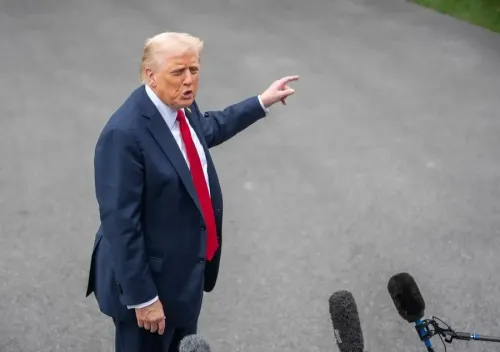Is the Chinese Communist Party Expanding Its Influence and Surveillance Operations in the US?

Synopsis
Key Takeaways
- CCP's Influence: The Chinese Communist Party is extending its reach into US institutions.
- Surveillance Operations: Covert monitoring and intimidation tactics are being employed against dissidents.
- Impact on Freedom: These actions challenge fundamental democratic values such as freedom of speech and academic inquiry.
- Digital Manipulation: The CCP utilizes disinformation campaigns to control narratives.
- Legal Tactics: China employs legal systems to intimidate critics abroad.
New Delhi, Aug 10 (NationPress) The Chinese Communist Party (CCP) is intensifying its influence and surveillance activities on American soil. This expansion spans academic institutions, cultural organizations, and covert intimidation tactics against dissidents, signaling a profound reach into the fabric of democratic society in the US.
This initiative has been orchestrated by the CCP to safeguard its reputation, suppress criticism, and ensure adherence to its ideology—targeting even those who have fled China seeking freedom. The extraterritorial campaign not only jeopardizes the safety of Chinese nationals abroad but also threatens the integrity of US institutions and values, as reported by European Times. Allegedly disguised as community service centers, these outposts are said to monitor and intimidate members of the Chinese diaspora, particularly those who express dissent against the CCP.
The FBI's recent arrest of two individuals in New York involved in operating these illegal stations marked a rare instance of public accountability. Prosecutors allege they acted under directives from China’s Ministry of Public Security and attempted to coerce a Chinese dissident into returning to China. These actions illustrate the lengths to which China will go to extend its authoritarian control into democratic societies.
The report characterizes China's strategy of transnational repression as “persistent and systematic.” The CCP aims to silence critics, especially those from ethnic minorities, democracy advocates, and religious practitioners who have managed to escape its grasp yet continue to voice their opposition in other countries.
Chinese students and scholars in the US have reported being monitored, harassed, or coerced into silence. Numerous individuals fear repercussions for their families back home if they dare to oppose the regime. Professors discussing sensitive topics related to the Chinese government, such as Hong Kong, the Tiananmen Square massacre, Tibet, and Xinjiang, have faced online threats and harassment. For instance, Uyghur Americans often receive anonymous threats or warnings concerning their family members still in Xinjiang.
China's influence operations do not remain hidden; much of its presence is overt, backed by economic investments and cultural diplomacy. The CCP's United Front Work Department, a vast bureaucratic entity dedicated to shaping foreign public opinion, has amplified its global operations, including in the US.
Meanwhile, Chinese student organizations on US campuses, some reportedly linked to Chinese consulates, have been accused of monitoring fellow students and reporting perceived “unpatriotic” behavior. This creates an atmosphere of fear and self-censorship within academia, undermining the very principles of free inquiry that underpin higher education in the United States, according to the European Times.
The CCP is also extending its power into the digital sphere. Its use of disinformation campaigns, cyber espionage, and digital surveillance tools is well documented. Pro-Beijing networks regularly exploit social media platforms like Twitter, Facebook, and YouTube to discredit critics, promote CCP narratives, and harass activists. Many of these accounts engage in coordinated disinformation efforts aimed at distorting public discourse, eroding trust in democratic institutions, and fostering societal divisions.
Moreover, Chinese tech companies operating globally often face obligations to comply with laws that necessitate cooperation with the Chinese state. This has raised significant concerns among policymakers, particularly regarding apps like TikTok, owned by ByteDance. Issues of data privacy and potential censorship, along with the psychological and cultural influence of content algorithms aligned with CCP interests, have come under scrutiny.
China's overseas repression also utilizes a “lawfare” strategy, employing legal systems to target critics. Chinese officials have sought to manipulate international extradition treaties, Interpol notices, and bilateral law enforcement agreements to pursue legal actions against exiled dissidents under the pretext of criminal charges. Concurrently, Beijing employs lawsuits and legal intimidation to stifle journalism and research critical of the Chinese regime, the report stated.
The message the CCP conveys through these tactics is that there is no safe haven. Criticism of the CCP can follow individuals—be they students, activists, academics, or ordinary citizens—even within the United States. Often, the CCP's reach extends beyond foreign policy elites or national security threats, targeting individuals merely seeking basic freedoms such as the right to express their views, protest, and live without fear. The transnational repression and influence efforts of the CCP pose a direct challenge to the core values of US democracy—freedom of speech, academic liberty, transparency, and human rights.









